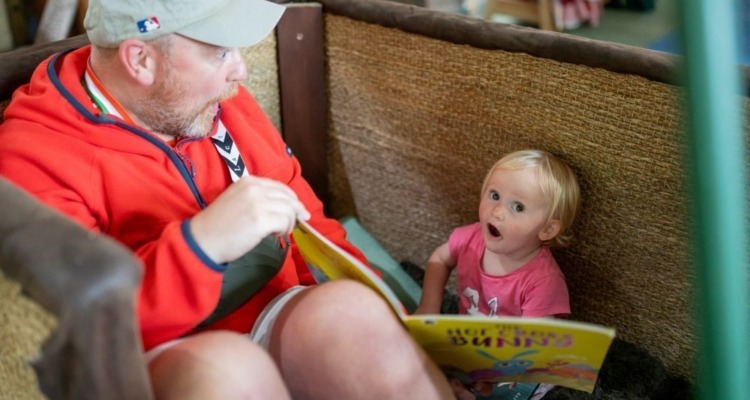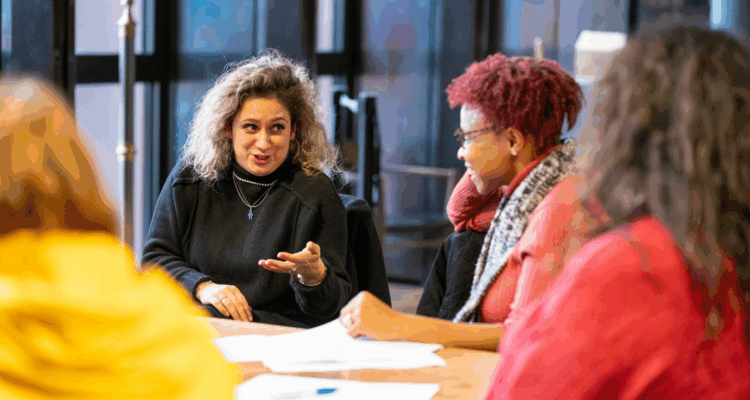9 things I’ve learnt from Shared Reading in the UK’s most secure prisons
As our Criminal Justice People and Project Manager, Kate Bramhall, moves onto pastures new she reflects on her time at The Reader. She has worked for seven years delivering Shared Reading groups in UK prisons.

1.My years reading with the residents in approved premises and prisons have held some of the best experiences of my life.
What a privilege to be given access to walk within those walls. These strange and foreboding, gigantic and oppressive, grey and crumbling, buildings. These are paths and corridors few get to walk. And yet, within them, I found, the smallest little spaces, filled with magic. It felt like looking around Bluebeards castle only behind the doors I did not find horror, I found beauty.
I found beautiful, if sometimes fractured, souls so grateful to be given the space to shine, to think and share what they had been holding so close.
I have sat and watched as grown, tattoo covered men, discovered a poem, story, or phrase, that has knocked free a knot in their chest, and they have wept unashamedly.
2. I never expected to find so much hope in these walls that are for the most part so devoid of it.
And that was a beautiful thing to be in the presence of. In the room, in the poems, in the stories, the men spoke to me of their dreams, for themselves and for their families.
I worked with a man in a maximum-security prison who had been inside for 30 years. He came to my groups every week and often engaged but remained on the peripheral of personal sharing, until one day we read a poem that mentioned bees and that man came alive. He shared with everyone his dream of keeping bees when he got out. That he would love to find a little corner of the world to live quietly and raise bees.
Another young man, who I worked with, was doing his degree while in prison. He had been convicted as a teenager, with no education and now, at 30 was completing a degree in psychology. He was so enthusiastic; he would tell me all about his course work every week and he was getting much higher grades than I ever got at Uni!
But it really isn’t one thing that made up this amazing experience – it's being able to enter these spaces and have access into the worlds of these men and women at this stage of their lives.
We are all on a journey of discovery, we all change and learn with age and experience, but some paths are rockier, some have blind corners and wrong turns. When you get to be a part of someone else’s journey and, hopefully, help them to navigate around some of those corners and find a safer path it is a privilege.
3. What I didn’t expect was the welcome I would get from everyone - the eagerness, kindness and joy I received from the residents.
They wanted to be there, in the room with me, doing this thing called Shared Reading. And they gave, so much! I never completely lost the feeling of being cautious, but I do not think we ever should in this work. What we do is powerful, and we work with vulnerable people, I never forgot this.
These groups aren’t just for the men and women, they are for the officers, the psychologists and the managers. So many times, prison and probation staff members have told me how much the groups had helped them work with the residents. It helps to build trust, and this is so important for growth.
I have moved around a lot to set up new groups all over the country but there is a Cat B prison in the Midlands that holds my heart.
It was my first prison, and I was there for two years before Covid hit. The prison was badly hit by Covid. It took nearly two years to get back in, but when we were allowed, I went back.
A lot of the residents had moved on, but one who was still there was so excited to have us back, he’d been around and promoted the groups and got so many sign ups we had to start alternating groups members to every other week so we could fit them all in.
It is the most wonderful unit; the residents are so committed to the groups and the officers just ‘get it’. I would go back there in a heartbeat. I must be one of the only people in the world desperate to get back into a prison!
4. I am driven to do this work for a personal reason, because, as clichéd as it sounds, I honestly believe there is another reality where I am the one behind these walls without a key.
My path was not smooth and I have made very poor decisions. When I was a teenager in the 1990s my family held, what we would now call ‘an intervention’. My friend asked me to go to her house and when I got there the room was filled with a number of my childhood friends, my mother and oldest sister.
I was confronted with the knowledge that everyone knew what I had been doing. My mother was crying. But I couldn’t get past the fear I saw in my sister's face. I left that room and the following day I enrolled in college (I later dropped out but it was a start).
A month later, the girls I had been spending all of my time with were arrested and spent the next four years in prison. Not everybody has a family and friends to trick them into a small front room and confront them with care and love. We all need someone to believe in us.
5. I have to say, I have never felt scared.
Overwhelmed, overawed or cautious maybe is a better way to describe it. These are huge, often old and Victorian, oppressive buildings and you are always aware of the particular nature of the space you are stepping into. What I felt was small and honestly, a little confused as to how I had managed to blag myself into this: how had I been given these keys and access to this world?
But I do not think I alone overcame these feelings; the residents, the officers and the work, did that for me! I applied for this job as I have never believed people are born evil, life isn’t that black and white, but people can do bad things.
I am not ignorant to the crimes these men and women have committed. The pain and devastation they may have caused to others. But, let’s be frank, who would you want to be living next door to you, the man or woman that had committed an offence and then been held in a prison treated badly, offered no hope of change with no intervention or someone who had been given the opportunity to grow and make positive change?
This isn’t about being soft, trust me. With growth comes the pain of understanding your actions and that is not something that is easy. I once worked with a young man who told me for the first seven years of his sentence he never once looked at himself in the mirror. Growth is hard, truth is hard, but kindness gives people the chance to imagine their lives in different ways and that is good for everyone.
6. Ask yourself, truthfully, what do we all want? What do we all need? We need to be heard. Being heard is being seen.
Many of the residents in these settings have spent a long time being invisible. In these small spaces, for this hour and a half of the week, we are all heard without judgment - and what’s more, with appreciation. And not just from us as the group leads, from each other and the guards. The support and care they can offer each other is free-ing.
What I have heard so many times from Officers is ‘the men in that room are not the men we see on the wing’ and how wonderful must that feel. To have a little pocket of time when you do not feel the need to be ‘on guard’ to be ‘strong’ or ‘hard’. They can sit safely within the story or poem and find the words to speak truths they have held so tightly. What I see in the room is a little bubble of freedom.
7. Some days it feels elating.
The group’s commitment and input can make you forget where you are. When you have a day like that, any group leader will tell you, you are not in a prison, you are just people in a room sharing a wonderful experience. And anyone that knows Shared Reading will know, these aren’t everyday experiences. Shared Reading creates an environment like no other. It creates a space of such openness and transparency that it can feel like touching joy, touching hope, touching what it is to be human.
Because in what other experience would you just put down your armour and share who you really are. I definitely do not speak in such a freeing way in day-to-day life.
Some of my all-time favorite go-to’s are
- The Veldt - Ray Bradbury (short story)
- Supertoys Last All Summer Long: And Other Short Stories – Brian Aldiss
- I Love Uncertain Gestures – Valerio Magrelli (poem)
- One Flesh – Elizabeth Jennings (poem)
But other days can be hard, if a story doesn’t land how you hoped, or something else is happening on the wing that can be causing fear and worried, you feel it too. On those days you can feel the bricks of the walls. You hear every key turn, every gate slam. On these days you really see where you are and understand how the residents may feel… just a little.
8. You have to care, but also have the ability to laugh.
The residents don’t always want someone to go in and say, ‘oh this is terrible, oh poor you’. They are looking to step outside of the walls for just a small while, and you are there to guide that walk. I think humour is a big part of this, I have never laughed so much than in some of these groups.
I once ran a group in a Cat B prison when a budgie flew into the room. Everyone carried on, engrossed in the story. I was eyeing it out of the corner of my eye thinking ‘how funny’. Then he flew over and perched on my head. Everyone laughed but swiftly got back into the story. I thought, if no one else is breaking the spell for this I can’t. Asbo the budgie nestled into my hair, which is a little like a bird's nest anyway, and we all carried on!
9. One resident in a maximum-security prison was so thankful for the Shared Reading group, he told me he had not once switched on the TV in his pad since discovering a joy of reading.
He talked me through all the books he had got out of the library. That meant something. to him and to me.
This same resident had one day approached me outside of a group and said ‘You seem like a lovely person, why do you do this? Why do you come here? You know what we have all done?’
I think part of that was his trying to sus out if I was ‘safe’, but I also feel another part was a genuine wonder, as he didn’t understand why anyone would.
Imagine feeling so little of yourself as to wonder why anyone would spend time with you by choice.
Another resident used to write me a poem after every group which was inspired by the story or poem we had read.
I’ll end with a poem… because why wouldn’t I…?
What If This Road
What if this road, that has held no surprises
these many years, decided not to go
home after all; what if it could turn
left or right with no more ado
than a kite-tail? What if its tarry skin
were like a long, supple bolt of cloth,
that is shaken and rolled out, and takes
a new shape from the contours beneath?
And if it chose to lay itself down
in a new way; around a blind corner,
across hills you must climb without knowing
what’s on the other side; who would not hanker to be going, at all risks? Who wants to know
a story’s end, or where a road will go?
Sheenagh Pugh
If you'd like to find out more about our work in Criminal Justice settings, click here.
Share
Related Articles

We cannot just tell parents to read more. To truly improve children’s futures through reading, we need to properly support the adults around them to do so.
Responding to the Department of Education's announcement that 2026 will be a Year of Reading, The Reader's Managing Director Jemma…

Shared Reading in Wirral Libraries: ‘As a kid people read stories to you but as an adult you lose that – and it’s a fantastic thing to do!’
Two Strategic Librarians for Wirral Libraries, Kathleen McKean and Diane Mitchell have been working in partnership with the UK’s largest…

Pat: ‘You don’t need to be an academic – it’s about going on your gut feeling about a story or poem’
National charity The Reader runs two popular weekly 90-minute Shared Reading group at one of the UK’s most innovative libraries,…


